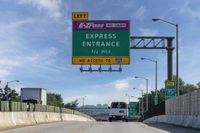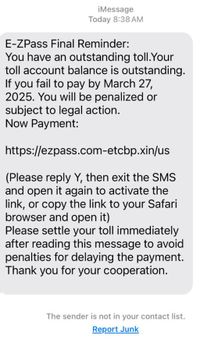In a troubling trend that is gaining traction across the United States, E-ZPass scams are taking advantage of unsuspecting drivers, particularly during the busy spring break travel season. This alarming rise in sophisticated fraud attempts is also known as "smishing" or SMS phishing, targeting those who rely on electronic toll systems.
The scams usually begin with a seemingly legitimate text message that appears to come from the E-ZPass toll system. These messages claim that recipients owe money for unpaid tolls and often create a sense of urgency, demanding immediate payment to avoid late fees or potential account suspensions. The requested amounts, ranging from $3.95 to $12.55, are small enough that recipients might not think twice before paying, aiming to evade any hassle associated with possible fines.
According to the FBI, they have received over 2,000 complaints related to such SMS scams impersonating toll collection services. This figure is likely to represent only a fraction of actual incidents, as many victims remain unaware or choose not to report the fraud. Recently, the fraud has been moving from state to state, adapting tactics to target various regional toll systems, further complicating detection efforts.
In New York alone, the Better Business Bureau reported that in 2023, the state registered 26,948 internet crime complaints, which resulted in a staggering $750 million in losses. Among those targeted, senior citizens have been identified as the most vulnerable demographic, calling for increased awareness and education about these scams across various age groups.
As an example of this widespread problem, Arizonan families embarking on spring break trips to California can find themselves at risk while traveling on toll roads. Some scammers are taking advantage of driver memories and wallets, sending texts that threaten immediate action for unpaid tolls. These messages might reference E-ZPass as a final reminder, stating, "you will be penalized and subject to legal action." However, it is critical to note that E-ZPass is not used in California, where FasTrak is the standard toll collection system.
Both E-ZPass and FasTrak have asserted that they never request personal information or payment through unsolicited text messages. According to reliable reports, bogus websites that were part of this scheme have been taken down, but the scams persist, often using different names to avoid detection.
Given the increasing sophistication of these scams, individuals need to be vigilant about protecting themselves. It's vital to remain skeptical of unsolicited messages. If you receive a text alleging overdue toll payments, do not click any links or respond. Legitimate organizations will never initiate contact via text for payment or personal information.
To independently verify claims about your account, always call the number on your transponder or visit the official website for your specific toll service. E-ZPass NY customers can call 1-800-333-8655 to confirm any dubious communications. Keeping your device secure is also crucial; make sure your phone's operating system and security applications are up to date, and consider installing anti-malware software for additional protection against potential threats.
Moreover, enabling multi-factor authentication on sensitive accounts, such as those related to banking or health records, can add a layer of security. If you believe you've fallen victim to an E-ZPass scam, it's imperative to report it to law enforcement, the FBI's Internet Crime Complaint Center (IC3), and the Federal Trade Commission (FTC). Quick action not only helps prevent further fraud but also assists authorities in their efforts to track down the perpetrators.
This current wave of E-ZPass scams illustrates the increasing risks associated with digital convenience. As technology evolves, so too do the methods employed by those looking to exploit unsuspecting individuals. Awareness and vigilance remain the best defenses against these sophisticated fraud attempts.






